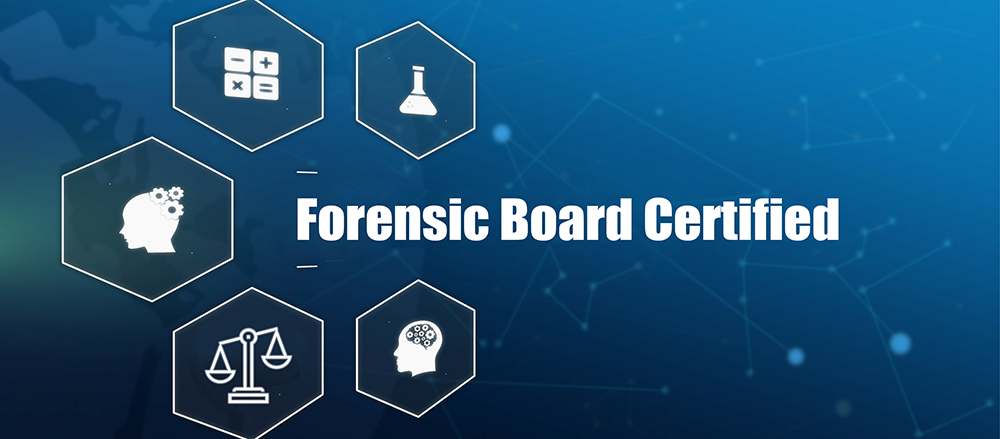Forensic board certification is one of only two specialty board certifications recognized by the American Psychological Association Directory meaning the certificate holds a longstanding significance in the psychological community.
Dr. Richart L. DeMier is a board-certified forensic and clinical psychologist who offers a program, in partnership with the American Academy of Forensic Psychology and CONCEPT,
on preparing for board certification in forensic psychology, Dr. DeMier covers:
- The fundamentals of forensic psychology
- Why earning board certification is valuable
- How to navigate available resources in preparation
To see how board certification is achievable with CONCEPT, read Dr. Kyle Clayton’s case study.
Dr. Clayton, Ph.D., ABPP, is now a Board Certified Forensic Psychologist.
Forensic Organizations to Know
Familiarize yourself with the following psychology organizations to avoid confusion throughout the application process:
- The American Board of Professional Psychology (ABPP) is the major organization to offer specialty board certification for various specialties like forensic psychology. ABPP is where the application process resides.
- The American Board of Forensic Psychology (ABFP) is responsible for the certifying process. ABFP-certified professionals work with the ABPP to conduct various parts of the certification process, such as the oral exam.
- The American Academy of Forensic Psychology (AAFP) is a nonprofit organization composed of board-certified forensic psychologists. AAFP offers continuing education, promotes scientific discourse, and presents professional awards.
AABP, AAFP, and ABFP are independent yet affiliated organizations. They consist of similar organizational goals to maintain high standards of specialization within the forensic psychology field.
Step 1: Apply for ABPP Board Certification
A licensed psychologist needs to complete the application with the American Board of Professional Psychology to begin the forensic board certification process. Here’s a link to register for the application process.
Step 2: Meet General Requirements
- Accredited Doctoral Degree Program or Equivalent
- Licensure
- Accredited Internship or Supervision
To earn a specialty certification in forensic psychology, an applicant must meet both the specialty and general requirements indicated by the American Board of Professional Psychology. An applicant needs a doctoral degree from an accredited program to meet the general requirement.
Acceptable degrees include American Psychological Association accreditation, Canadian Psychological Association accreditation, or a Certificate of Professional Qualification (CPQ) by the Association of State and Provincial Psychology Boards (ASPPB). After 2018, health service psychology programs are eligible with the proper accreditation.
Also, the candidate must be a doctoral, licensed psychologist who is able to practice independently. This ASPPB resource details location-specific licensure requirements. The applicant must also complete their accredited internship or supervised experience to fulfill the general requirement.
If your psychology program does not have the necessary accreditation, there are supplemental forms to upload with your application for the ABPP committee’s consideration. This option applies to degrees earned in the United States and Canada.
At this point in the process, the application undergoes a review to certify their credentials. If accepted, the candidate is eligible to continue with the rest of the application process.
Step 3: Meet Speciality Requirements
- Accredited Doctoral Degree Program or Equivalent in Professional Psychology
- 100 Hours of Postdoctoral, Specialty Training
- Continuing Education
- 1:1 Supervision with Qualified Professional
- Graduate Level Course
- Postdoctoral Speciality Experience
- 1,000 hours of direct experience in forensic psychology over a minimum of 5 years
OR
-
- 2,000 hours formal postdoctoral training program in forensic psychology
Your professional psychology degree needs to hold APA or CPA accreditation to meet the specialty-specific requirements. Certification requires at least 100 hours of qualifying, specialized training after completing a doctoral program.
One-to-one supervision with a qualified professional, certified continuing education programs from an organization like CONCEPT, and didactic graduate-level courses satisfy the 100-hour requirement.
Specific programs qualify for a waiver toward the postdoctoral specialty experience, so browse the ABFP Experience Waiver Postdoc Training Guidelines from the forensic specialty document library.
Step 4: Complete Written Exam & Submit Practice Samples
Certification in forensic psychology requires a written exam. The exam includes 208 questions covering seven subjects in forensic psychology. The written score is valid for five years. Candidates who pass the written exam are able to submit practice samples.
Practice samples are necessary to demonstrate specialty skills. ABFP requires two distinct samples, usually forensic reports written during their time as a practicing professional. The accepted samples decide the topics evaluated during the oral examination.
The written examination includes a $300 fee, and the practice samples require a $250 payment. Certain discounts apply to members like those who hold a Certificate of Professional Qualification (CPQ).
Step 5: Complete Oral Exam
The oral examination consists of three ABFP certified psychologists who assess a candidate’s breadth of knowledge in the provided samples, forensic ethics, and core competencies. The time during the exam is split between discussing the two distinct cases in the forensic report provided as a sample.
The oral examination rubric lists ethical standards, quality of practice, and knowledge of forensic areas as measurable components. There is a $550 fee to take the oral examination, which lasts approximately 3 hours.
Candidates who pass become specialists with ABFP, ABPP, and AAFP. Those who do not pass the oral examination either must submit two new samples in the following examination, and candidates who do not pass twice must wait one year before their next attempt. There is also a process to appeal a decision in the oral examination guidelines.
Step 6: Receive Certification
After succeeding through the previous steps, the final one is celebrating board certification. ABPP provides a list of twelve certification benefits. Most certification benefits involve pay benefits, professional career advancement, and privileges in hospitals or medical centers.
Application Checklist
- Doctoral Program Information
- Internship Program Information
- State Licensure Details
- Specialty Experience Documentation & Details
- Membership Affiliation Details
- Ethical Violations History
- Endorsement Forms or Letters of Recommendation
- Current CV
- Application Fees
This official overview and introduction to ABFP includes a guideline to the board certification process, the importance, and the rationale behind the examination procedure.























